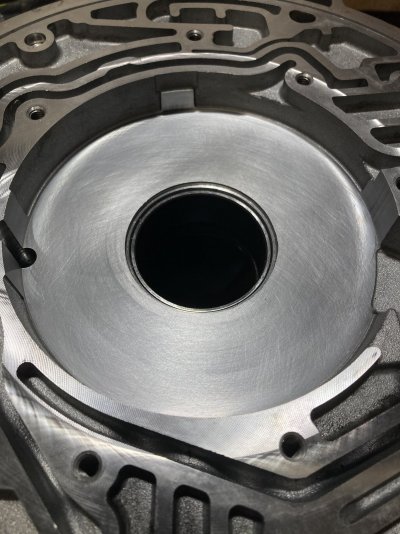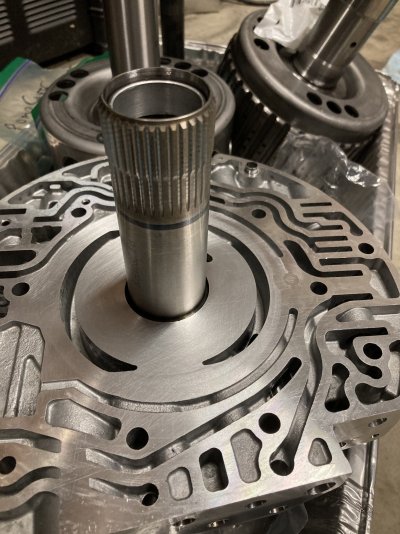My new to me 214K mile 2011 Yukon Denali XL had brown transmission fluid, and it seemed like I was on borrowed time after reading lots of info on this forum. It shifted fine, but I figure now is the time to investigate and be proactive, so I pulled the trans.
I recommend pre-emptively replacing the torque converter at 150K miles if everything is stock including DOD/AFM, tune, etc. Changing the TCC engagement and DOD/AFM may help prolong the life, and if you are the owner from low miles with extensive fluid/filter service, maybe this doesn't apply. If you have a 2010+ 6L80 with no shifting issues or cracked/leaking drums, and good maintenance you may be one of the lucky ones that could go 300K+ with just a new converter and valve body updates without a true rebuild.
If you watch the rebuild or disassembly videos on youtube, you definitely see the carnage from the common TCC failure destroying the pump and sending metal everywhere causing all sorts of issues. I don't know how close I was to TCC failure, but I wanted to give a little insight as to what a high mileage trans looks like without a TCC failure. My filter was dated 2011, so it is original. I have no idea of the service history of the trans, but the fluid was pretty brown, but not burnt smelling or tar like. 4-5-6 clutches were slightly worn, but none of the piston seals were damaged.

I did replace the bellhousing because it was only $120 for the new GM part with a new bushing and seal, but the original is reusable. I only did some brief scotchbrite cleaning to verify the scratches were minor.

I did reuse the pump stator, and you can see here the pump surface is super clean. 2011 already has the updated seals, so no reason to upgrade. I did do the Sonnax zip kit which supplies an upgraded pressure regular valve, but mine was undamaged unlike many others (which I think is related to metal from clutch failure).
The only real issue for my less-than-proper-serviced trans was a seal between the case and valve body, which could have been replaced with the trans in the vehicle. So I feel pretty confident that replacing the torque converter and servicing the valve body will greatly extend the life of a 6L80. And you can do both of these without moving the trans outside the frame rails.
I recommend pre-emptively replacing the torque converter at 150K miles if everything is stock including DOD/AFM, tune, etc. Changing the TCC engagement and DOD/AFM may help prolong the life, and if you are the owner from low miles with extensive fluid/filter service, maybe this doesn't apply. If you have a 2010+ 6L80 with no shifting issues or cracked/leaking drums, and good maintenance you may be one of the lucky ones that could go 300K+ with just a new converter and valve body updates without a true rebuild.
If you watch the rebuild or disassembly videos on youtube, you definitely see the carnage from the common TCC failure destroying the pump and sending metal everywhere causing all sorts of issues. I don't know how close I was to TCC failure, but I wanted to give a little insight as to what a high mileage trans looks like without a TCC failure. My filter was dated 2011, so it is original. I have no idea of the service history of the trans, but the fluid was pretty brown, but not burnt smelling or tar like. 4-5-6 clutches were slightly worn, but none of the piston seals were damaged.

I did replace the bellhousing because it was only $120 for the new GM part with a new bushing and seal, but the original is reusable. I only did some brief scotchbrite cleaning to verify the scratches were minor.

I did reuse the pump stator, and you can see here the pump surface is super clean. 2011 already has the updated seals, so no reason to upgrade. I did do the Sonnax zip kit which supplies an upgraded pressure regular valve, but mine was undamaged unlike many others (which I think is related to metal from clutch failure).
The only real issue for my less-than-proper-serviced trans was a seal between the case and valve body, which could have been replaced with the trans in the vehicle. So I feel pretty confident that replacing the torque converter and servicing the valve body will greatly extend the life of a 6L80. And you can do both of these without moving the trans outside the frame rails.

